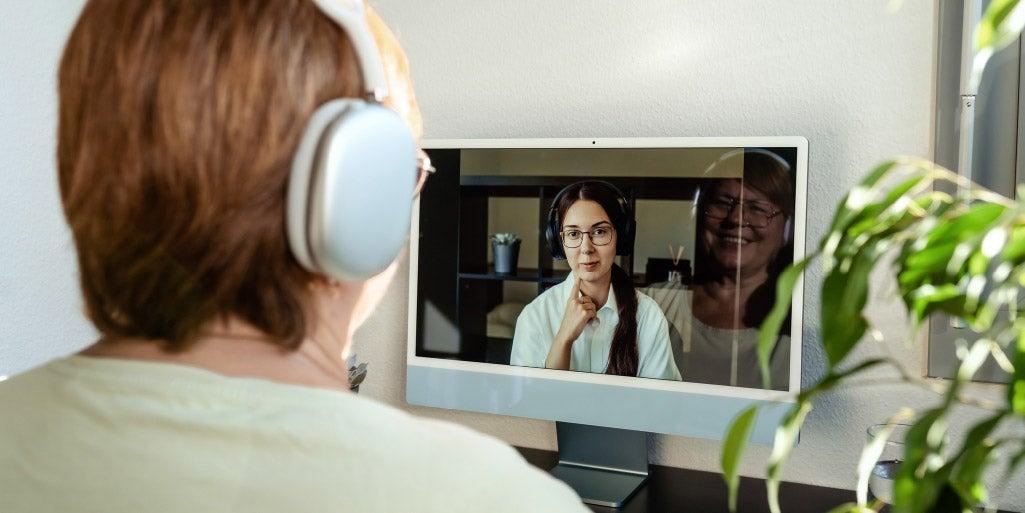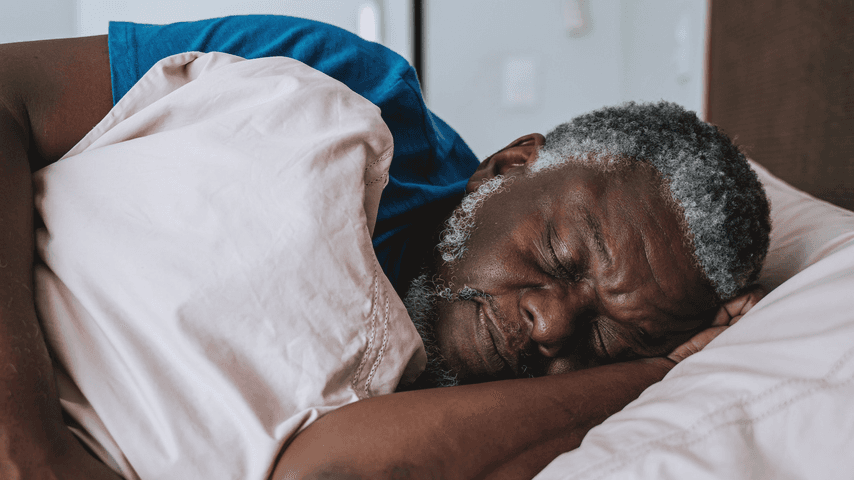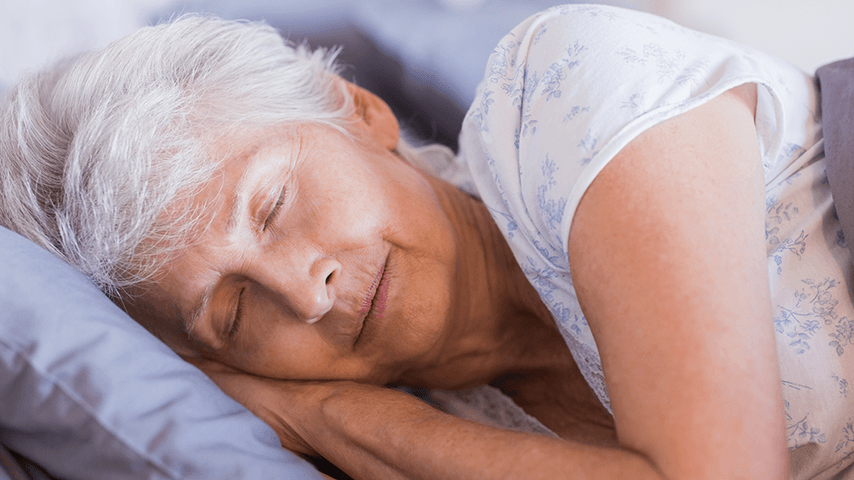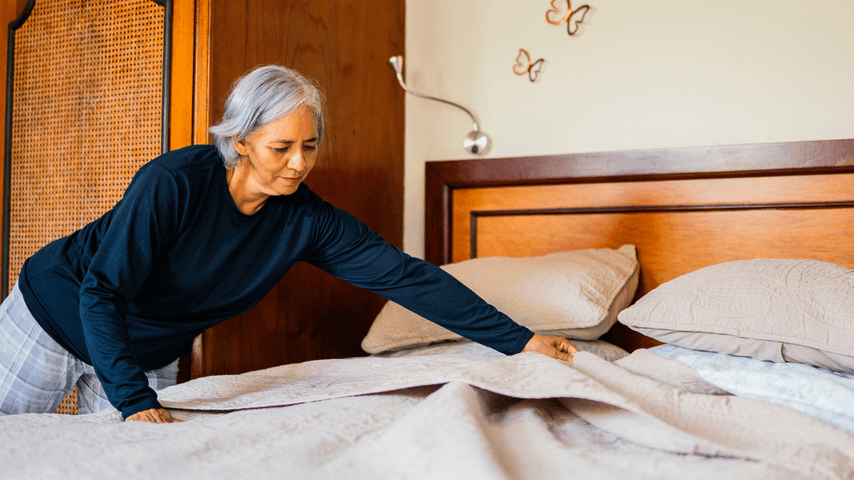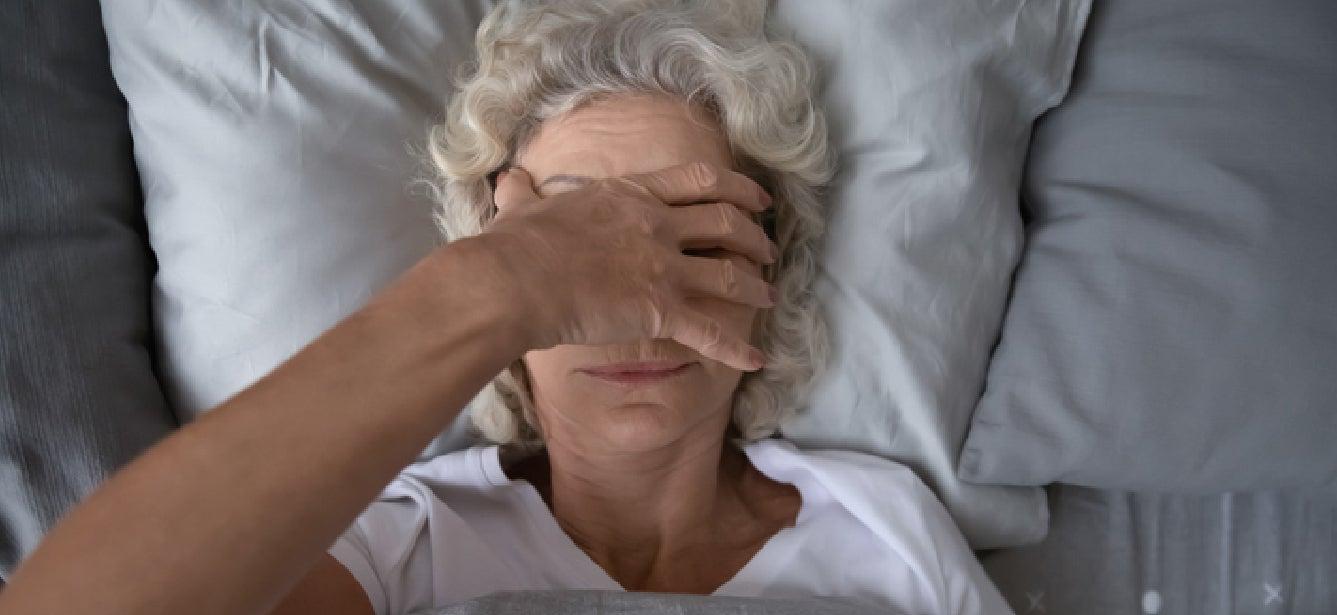
Related Topics
Do you ever pour a glass of wine, or pop open a beer, at the end of the day to “wind down?” Do you look forward to its relaxing effects and hope it might help you sleep?
If so, you’re certainly not alone. Nearly half of adults over age 65 report having consumed alcohol in the past year, according to NCOA guest author and alcohol use researcher Paul Sacco. And sometimes, they say they’re drinking to cope with a challenging symptom like insomnia.
They’re not alone, either. Among people of any age who suffer from persistent insomnia, 30% report using alcohol as a sleep aid. Further, 67% of those people say that it helps.1
As research consistently shows, however, the opposite is actually true. Drinking alcohol might help you fall asleep—but it won’t keep you there. And the negative effects of interrupted sleep can add up over time, leading to other unwanted health concerns including chronic pain.
Understanding the effects of alcohol on sleep
How does alcohol affect sleep?
It can be confusing: people with insomnia say that drinking alcohol helps them sleep. And yet, as many as 70% of people who use alcohol suffer from insomnia.2 So which comes first?
“It’s fairly clear that drinking alcohol isn’t good for sleep,” said Kathleen Cameron, former Senior Director of NCOA’s Center for Healthy Aging. “If you only drink occasionally, this may not be a huge concern—but if you’re someone who reaches for your wine glass or mixes a cocktail every time you can’t sleep, you’re likely making things worse.”
That’s because alcohol interferes with the ability to stay asleep and to get high-quality, deep sleep. The effects both can happen right away and develop over the long-term.
Alcohol negatively affects sleep immediately in the following ways:
- It disrupts the sleep cycle.
First, it helps to understand the normal sleep cycle, which includes four distinct parts: Stage 1 (N1); Stage 2 (N2); Stage 3 (N3, or “delta sleep”); and Stage 4 (REM sleep).3
When you’re in the first two stages, you’re in “light sleep.” When you’re in the third stage, you’re in “deep sleep.” And the fourth stage is your “vivid,” or dream, stage. While every person’s individual sleep cycle varies, it’s generally true that each of us goes through four to six rounds of it. Each cycle lasts around 90 minutes total, which adds up to between six and nine hours of sleep.
Of the four stages, REM is the one when our brains do some “heavy lifting:” processing emotions; combining and making sense of memories and knowledge; strengthening neural connections, and more.4 Getting enough REM sleep is associated with increased creativity, emotional well-being, and even longevity.4
That’s why it’s important to understand how alcohol affects your sleep cycle. Unlike gin and tonic, alcohol and REM don’t mix. In fact, research shows that drinking before bedtime can delay REM sleep. Alcohol may even shorten the time you’re in it, or prevent you from entering REM sleep at all.5
Alcohol can disturb other sleep stages, too. It’s a sedative, so it can send you into a deep sleep quickly—but that’s not what’s supposed to happen. In other words, it throws off the first two stages of light sleep, and it can be difficult for your body to readjust during the remainder of the night.
- It leads to fragmented sleep.
As the alcohol in your system begins to wear off, something called “homeostatic recovery” can occur.
“Simply put, this term describes the body’s natural urge to make up for a disrupted sleep cycle,” Cameron explained. “For example, because alcohol causes you to get too much deep sleep too soon, your body will re-set by extending how long you’re in Stage 1 and Stage 2 sleep for the rest of the night.”5
However, homeostatic recovery has negative consequences. Because you’re more likely to wake up in those early stages of light sleep, you’re also more likely to experience a restless night’s sleep after drinking alcohol.6,7 This robs you of the full healthful benefits that come from a complete sleep cycle.
Further, alcohol acts as a diuretic—meaning it makes you need to pee. This, too, can wake you up in the middle of the night, sometimes more than once. And the more water your kidneys release, the higher the chances you’ll get dehydrated. Dehydration can give you a headache; and pain itself can cause poor sleep. Also, getting up multiple times at night puts you at increased risk for falling.
“It’s truly a vicious cycle,” Cameron said.
- It causes breathing problems.
Have you ever woken yourself up snoring after an evening cocktail or two? As it turns out, alcohol might be to blame. That’s because alcohol and sleep apnea often go hand-in-hand—even in people who don’t otherwise have the condition.
Obstructive sleep apnea (OSA)—when the soft tissues in the throat collapse and block the airway—especially correlates to drinking because of alcohol’s relaxing effects.8 Research shows that people who consume alcohol have a 25% higher risk of having obstructive sleep apnea.9 This risk increases in people who already snore.8
Alcohol also can make central sleep apnea worse. Central sleep apnea happens when the central nervous system fails to tell your respiratory system what to do. Because alcohol slows brain activity, drinking can temporarily short-circuit the signals your brain is trying to send to your lungs.8
- It might interfere with circadian rhythms.
Our circadian rhythm is sometimes called our “biological clock”—the process that regulates the way our bodies function during each 24-hour daily cycle.
Researchers continue to investigate the complex relationships between alcohol and circadian rhythms. There are many things they don’t know; at the very least, there appears to be a strong link between alcohol consumption and the body’s ability to produce melatonin—the hormone that induces sleep.10
- It creates an unhealthy cycle.
People who wake up tired every morning may be more likely to lean back in to drinking to help them sleep better. But this can create a negative pattern that leads to more serious, long-term effects of alcohol on sleep.
What are the long-term effects of alcohol on sleep?
Regularly drinking more than the recommended amount of alcohol can have multiple negative effects: not only on your sleep, but on your physical and mental health over the long term.
- It can turn sleep disruptions into a chronic issue.
Long-term alcohol use can create tolerance—meaning that you need to drink more to experience alcohol’s effects. If you use alcohol to fall asleep, this not only can alter the brain chemicals that regulate your sleep cycle and circadian rhythms—sometimes permanently—but also it can pave the way to abusive drinking overall.2,5
- It can lead to more serious sleep disorders.
Ironically, people who rely on alcohol for sleep often complain of sleep deprivation, poor sleep quality, waking often during the night, and feeling sleepy during the day.2 Each of these complaints is characteristic of insomnia11—a condition that, when chronic, can impact your ability to focus on important tasks; dampen your mood; and increase your risk for falls.12
And if you already live with obstructive sleep apnea (OSA), alcohol can cause further complications including potentially fatal levels of carbon dioxide in your blood.8
- It can cause additional serious health problems.
Among other things, chronic sleep deprivation is linked to stroke, obesity, depression, and kidney and heart disease.12 Sleep problems may play a direct role in increasing the risk of Alzheimer's disease.13
How to achieve better sleep and sleep quality without alcohol
Alcohol and poor sleep are directly related: one impacts the other. The more you drink, the less you sleep; and the less you sleep, the more likely you may be to consume alcohol to cope. As we’ve seen, this cycle is unhealthy. The good news is that it’s possible to break this cycle.
Here are some simple strategies you can try—without reaching for another glass.
Practice good sleep hygiene
- Set a schedule for sleep. Support your body’s natural circadian rhythm and sleep cycle by going to bed and getting up at about the same time each day.
- Develop a night-time ritual. Help your body and mind wind down with a soothing activity: take a bath; write in a journal; listen to some relaxing music.
- Make your bedroom a sanctuary. Eat, work, and watch TV elsewhere. Set the thermostat to a comfortable level; for many people, that means on the cooler side. Save your space for sleep and intimacy.
- Avoid late-night eating and drinking. A full stomach can make it hard to fall asleep. Caffeine and alcohol can disrupt it. Limit meals and beverages close to bedtime.
- Slash screen time. “Blue light” from digital devices disrupts circadian rhythms; news and social media can be upsetting and keep you awake. Put your phone out of reach.
Make positive lifestyle changes
- Try yoga or meditation. Practicing mindfulness can calm racing thoughts, slow your heart rate, relax tensed-up muscles, and create a sense of well-being.
- Get regular exercise. Physical activity can lower your blood pressure, reduce anxiety, ease certain types of pain, and boost your mood.
- Stay socially engaged. Reducing loneliness can improve your sleep, too. Volunteer, attend a lecture, or take a class at your local community center.
- Consult a professional. A qualified sleep specialist or mental health provider can help you overcome insomnia. For some people, mental health conditions, like depression and anxiety, are linked to insomnia.
Consider natural sleep aids
- Swap out that drink. Certain non-alcoholic beverages can encourage sleepiness, including chamomile tea, warm milk, and tart cherry juice.
- Try a supplement. Talk to your health care provider about over-the-counter melatonin and whether it may be right for you.
Upgrade your bedding
- Invest in a new mattress. If you haven’t replaced yours in a while, or it’s no longer comfortable, consider purchasing the best mattress you can afford.
- Try an adjustable bed. If you snore, elevating your head and back can help. For those who sleep with a partner, finding the best split-king adjustable bed for you can help prevent you from waking one another.
The bottom line
If you struggle to slip into slumber, it can be tempting to pour a glass or wine or two. In reality, though, alcohol and sleep don’t mix well. While drinking may help you fall asleep, it won’t help you stay there. And the short- and long-term effects of alcohol on sleep can impact your health in unwanted ways: from interrupted REM sleep to sleep apnea, snoring, chronic sleep deprivation, and more. Over time, relying on alcohol to induce sleep also can build physical tolerance and even contribute to depression, risk for dementia, and heart disease.
The good news? There are common-sense strategies you can adopt to address insomnia and improve sleep quality without using alcohol. Give them a try today!
Sources
1. Timothy Roehrs, PhD, et al. Sleep, Sleepiness, and Alcohol Use. Alcohol Research and Health: The Journal of the National Institute on Alcohol Abuse and Alcoholism. 2001. Available on the internet at https://pubmed.ncbi.nlm.nih.gov/11584549/
2. Gustavo A. Angorita, et al. Sleep abnormalities associated with alcohol, cannabis, cocaine, and opiate use: a comprehensive review. Addiction Science and Clinical Practice. 2016. Found on the internet at https://ascpjournal.biomedcentral.com/articles/10.1186/s13722-016-0056-7
3. Cleveland Clinic. Sleep: How Much You Need and Its 4 Stages. December 3, 2021. Found on the internet at https://health.clevelandclinic.org/your-complete-guide-to-sleep
4. Carolyn Todd. REM Sleep is Magical. Here’s What the Experts Know. The New York Times. February 25, 2023. Found on the internet at https://www.nytimes.com/2023/02/25/well/mind/rem-sleep-benefits.html
5. Ian M. Colrain et. al. Alcohol and the Sleeping Brain. Handbook of Clinical Neurology. 2014. Found on the internet at https://www.ncbi.nlm.nih.gov/pmc/articles/PMC5821259/
6. Amelia Nierenberg. Why Does Alcohol Mess With My Sleep? The New York Times. June 22, 2023. Found on the internet at https://www.nytimes.com/2022/01/25/well/mind/alcohol-drinking-sleep.html
7. Brandon Peters, MD. Arousal During the Stages of Sleep. Verywell Health. April 28, 2022. Found on the internet at https://www.verywellhealth.com/arousal-during-sleep-3014849
8. Brandon Peters, MD. What’s the Link Between Alcohol and Sleep Apnea? Verywell Health. June 22, 2023. Found on the internet at https://www.verywellhealth.com/how-alcohol-affects-sleep-apnea-3014680
9. Evangelia Simou, et al. Alcohol and the risk of sleep apnoea: a systematic review and meta-analysis. Sleep Medicine. February 2018. Found on the internet at https://www.ncbi.nlm.nih.gov/pmc/articles/PMC5840512/
10. Tim Jewell. Taking Melatonin: Can You Mix Melatonin and Alcohol? Healthline. April 29, 2023. Found on the internet at https://www.healthline.com/health/melatonin-and-alcohol
11. National Library of Medicine. Insomnia. Found on the internet at https://medlineplus.gov/ency/article/000805.htm
12. National Heart, Lung, and Blood Institute. What Are Sleep Deprivation and Deficiency? March 24, 2022. Found on the internet at https://www.nhlbi.nih.gov/health/sleep-deprivation
13. Joel I. Shenker and Gurtej Singh. Sleep and Dementia. Missouri Medicine. July-August 2017. Found on the internet at https://www.ncbi.nlm.nih.gov/pmc/articles/PMC6140093/
